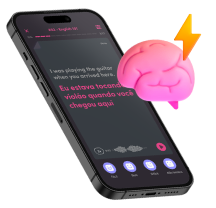Fluency News #45

Descubra as principais notícias da semana e pratique seu inglês com o Fluency News!
Navegue pelo conteúdo
Hello, everyone!
Sejam bem-vindos e bem-vindas a mais um episódio da nossa série de podcasts, o Fluency News! Aqui, você vai poder treinar a sua escuta e ficar por dentro do que está acontecendo no mundo, sempre com as três principais notícias da semana, tudo em inglês! Ao longo do episódio, nós também adicionamos explicações em português das coisas que achamos que precisam de mais atenção, assim você não perde nenhum detalhe!
No episódio desta semana, falamos sobre o Projeto Pegasus e a investigação que revelou o mau uso, feito por agências governamentais, dos dados de seus cidadãos, em todo o mundo. Também falamos sobre a China ser acusada de ter orquestrado um ataque cibernético ao Microsoft Exchange, e sobre as notícias vindas da NASA.
Temos uma página de dicas de inglês no Instagram, vá conferir! @fluencytvingles
Toda semana, temos um novo episódio do Fluency News, não deixe de escutar! See you!
Este episódio foi escrito por Lívia Pond.
TRANSCRIÇÃO
What’s up, guys! Welcome to episode 45 of Fluency News! I’m Scott Lowe, and thank you for joining us today, to practice your English and become informed.
Before we get to the news, let me just remind you that you can see the transcript of this episode and all of our sources by clicking the description of this episode on our content portal, fluency.io.
Today, our main stories are technology and privacy related. Let’s jump into it and talk about the Pegasus Project.
Human rights activists, journalists and lawyers across the world have been targeted by authoritarian governments using hacking software sold by the Israeli surveillance company NSO Group, according to an investigation into a massive data leak.
The Pegasus project is a collaborative journalistic investigation into the NSO Group and its clients.
Forbidden Stories, a Paris-based nonprofit journalism organization, and Amnesty International had access to a leak of more than 50,000 phone numbers selected as targets by clients of NSO since 2016.
Access to the data was then shared with the Guardian and 16 other news organizations, including the Washington Post, Le Monde, Die Zeit and Süddeutsche Zeitung. More than 80 journalists have worked collaboratively over several months on the investigation, which was coordinated by Forbidden Stories.
NSO sells surveillance technology to governments worldwide. Its flagship product is Pegasus, spying software – or spyware – that targets iPhones and Android devices. Once a phone is infected, a Pegasus operator can secretly extract chats, photos, emails and location data, or activate microphones and cameras without a user knowing.
The leak contains a list of more than 50,000 phone numbers that, it is believed, have been identified as those of people of interest by clients of NSO since 2016.
The presence of a phone number in the data does not reveal whether a device was infected with Pegasus or subject to an attempted hack. However, the consortium believes the data is indicative of the potential targets NSO’s government clients identified in advance of possible surveillance attempts.
Without forensic examination of mobile devices, it is impossible to say whether phones were subjected to an attempted or successful hack using Pegasus.
NSO has always maintained it “does not operate the systems that it sells to vetted government customers, and does not have access to the data of its customers’ targets”.
In statements issued through its lawyers, NSO denied “false claims” made about the activities of its clients, but said it would “continue to investigate all credible claims of misuse and take appropriate action”. It said the list could not be a list of numbers “targeted by governments using Pegasus”, and described the 50,000 figure as “exaggerated”.
This tool is regarded as such a serious cyberweapon that NSO can only export Pegasus to other countries with the permission of Israel’s Ministry of Defense. The company sells only to military, law enforcement and intelligence agencies in 40 unnamed countries, and says it rigorously vets its customers’ human rights records before allowing them to use its spy tools.
Officially, this tool can only be used against targets suspected of terrorism or taking part in organized crime. However, the investigative project has uncovered that many clients routinely target journalists, human rights defenders, opposition politicians, lawyers and businessmen with Pegasus.
Last month, NSO released a transparency report in which it claimed to have an industry-leading approach to human rights and published excerpts from contracts with customers stipulating they must only use its products for criminal and national security investigations.
There is nothing to suggest NSO’s customers did not also use Pegasus in terrorism and crime investigations, and the consortium also found numbers in the data belonging to suspected criminals.
However, the broad array of numbers in the list belonging to people who seemingly have no connection to criminality suggests some NSO clients are breaching their contracts with the company, spying on pro-democracy activists and journalists investigating corruption, as well as political opponents and government critics.
That thesis is supported by forensic analysis of the phones of a small sample of journalists, human rights activists and lawyers whose numbers appeared on the leaked list. The research, conducted by Amnesty’s Security Lab, a technical partner on the Pegasus project, found traces of Pegasus activity on 37 out of the 67 phones examined.
The Pegasus project is likely to spur debates over government surveillance in several countries suspected of using the technology. The investigation suggests the Hungarian government of Viktor Orbán appears to have deployed NSO’s technology as part of his so-called war on the media, targeting investigative journalists in the country as well as the close circle of one of Hungary’s few independent media executives.
The leaked data and forensic analyses also suggest NSO’s spy tool was used by Saudi Arabia and its close ally, the UAE, to target the phones of close associates of the murdered Washington Post journalist Jamal Khashoggi in the months after his death. The Turkish prosecutor investigating his death was also a candidate for targeting, the data leak suggests.
By accessing GPS and hardware sensors in the phone, he added, NSO’s clients could also secure a log of a person’s past movements and track their location in real time with pinpoint accuracy, for example by establishing the direction and speed a car was travelling in.
The latest advances in NSO’s technology enable it to penetrate phones with “zero-click” attacks, meaning a user does not even need to click on a malicious link for their phone to be infected.
Guarnieri has identified evidence NSO has been exploiting vulnerabilities associated with iMessage, which comes installed on all iPhones, and has been able to penetrate even the most up-to-date iPhone running the latest version of iOS. His team’s forensic analysis discovered successful and attempted Pegasus infections of phones as recently as this month.
Apple said: “Security researchers agree iPhone is the safest, most secure consumer mobile device on the market.”
NSO declined to give details about its customers and the people they target.
Since the investigation was brought to light, several government agencies across the world have had their actions questioned, as numbers can be traced to activists, journalists and oppositionists, some of which were killed or disappeared.
In 2017, for example, a Mexican journalist made a broadcast about alleged corruption and accused state police and local politicians of colluding with a violent local capo known as El Tequilero. Hours later, he was dead. His phone number appears on the leaked data. Although that is not confirmation that his phone was infected, it does put into question his death.
The investigation and repercussions are huge, not only in the technology and privacy world, but in everyday life, since it’s been proven that NSO is not targeting criminals and suspects of terrorism, but anyone, anywhere. As the fallout is still happening, there is much more to be uncovered, and we’ll definitely update you when we have additional information.
Em notícias em português, você já deve ter notado o uso de palavras como “disse”, “afirmou”, “relevou”, “deduziu” e muitas outras para citar uma fonte. Em inglês, o mesmo acontece, e cada uma dessas palavras é introduzida com cuidado, para garantir que o tom esteja correto, e que a notícia seja o mais verdadeira possível. A palavra “CLAIMED”, por exemplo, significa “alegou”, e é uma maneira de o jornalista indicar que o que foi dito é uma afirmação clara da fonte, mas que pode ser falsa. “SAID” significa apenas que a pessoa ou organização “disse” ou “falou” algo. “REVELEAD”, que significa “revelou”, vem sempre acompanhado de uma informação nova, uma revelação. É legal você tirar um tempo para perceber quais palavras são usadas ao citar uma fonte, e tentar compreender o que a notícia quer dizer com elas.
We also have to talk about the Microsoft Exchange leak that happened earlier this year. NATO and individual countries issued a rebuke of China over allegations the country was responsible for a massive hack of Microsoft Exchange email server software, and told the country it needs to “act responsibly.”
In the alliance’s condemnation of China, it called on Beijing to “act responsibly in the international system, including in cyberspace” and said it is determined to “actively deter, defend against and counter the full spectrum of cyber threats.”
Beijing was also accused by the Biden administration and Western allies of working with criminal hackers by using ransomware and performing other illicit cyber activities.
China has denied all the allegations, said it opposes all forms of cyber-crime, and has called the claims “fabricated”.
“The US has mustered its allies to carry out unreasonable criticisms against China on the issue of cybersecurity,” foreign ministry spokesman Zhao Lijian told reporters.
The UK, EU, New Zealand and Australia were among those to join the US in accusing Chinese state-sponsored actors of “malicious cyber activity”, including the Microsoft hack.
Microsoft’s Exchange system powers the email of major corporations, small businesses and public bodies worldwide. The hack affected at least 30,000 organizations.
Since all of that can be frightening, how about we take a look at some good news? First, the Hubble Space Telescope is functioning again after more than a month offline following a computer glitch.
On Saturday, July, 17, NASA said engineers had successfully switched the telescope, which orbits 340 miles above Earth’s surface, to backup hardware, a high-stakes maneuver that began Thursday.
“Hubble is back!” Tom Brown, head of the Hubble mission office, emailed to staff at the Space Telescope Science Institute at 5:56 a.m. “I am excited to watch Hubble get back to exploring the universe.”
“Hubble is an icon, giving us incredible insight into the cosmos over the past three decades,” NASA Administrator Bill Nelson said in a statement.
And still on NASA news, NASA and the European Space Agency have agreed to cooperate on future Earth science missions and related activities in an effort to better understand climate change.
The leaders of the two agencies signed a joint statement of intent in a virtual meeting July 13, declaring their plans to cooperate on Earth science research, particularly involving climate change, ranging from missions to research and applications.
“Climate change is an all-hands-on deck, global challenge that requires action now,” NASA Administrator Bill Nelson said in a statement about the agreement. “This agreement will set the standard for future international collaboration, providing the information that is so essential for tackling the challenges posed by climate change and helping to answer and address the most pressing questions in Earth science for the benefit of the United States, Europe, and the world.”
Você sabe o que a expressão ALL HANDS ON DECK significa? Ela pode ser traduzida literalmente para “todas as mãos no convés”, mas ela significa que algo requer a atenção de todos, que é muito importante. Essa expressão vem do mundo náutico, e é usada como um anúncio, um sinal, de que todos os membros da tripulação devem se dirigir ao convés no navio, normalmente indicando uma emergência. ALL HANDS ON DECK saiu só do mundo náutico, e agora é utilizada sempre que algo requer atenção e empenho de todos.
And this is the end of this week’s episode, folks. We will, of course, be back next week, with more relevant stories, and with updates to anything we’ve covered before.
Also, make sure to head over to fluency.io to have access to a ton more of free content. We’ll see you next week. Peace out.
Stories
The Pegasus Project
https://www.theguardian.com/news/2021/jul/19/fifty-people-close-mexico-president-amlo-among-potential-targets-nso-clients
https://www.npr.org/2021/07/19/1017846666/cybersecurity-malware-spying-israeli-hacker-group
https://www.theguardian.com/news/2021/jul/18/revealed-murdered-journalist-number-selected-mexico-nso-client-cecilio-pineda-birto https://www.vpnranks.com/blog/israeli-firms-spyware-found-on-phones-worldwide-targeting-activists-journalists/
https://www.bbc.com/news/technology-57881364
https://telex.hu/direkt36/2021/07/19/pegasus-nso-hungary-viktor-orban-cyberweapon
https://www.theguardian.com/news/2021/jul/19/nso-clients-spying-disclosures-prompt-political-rows-across-world
https://www.ndtv.com/world-news/pegasus-scandal-french-prosecutors-open-probe-into-alleged-media-spying-2490616
https://www.theguardian.com/news/2021/jul/18/viktor-orban-using-nso-spyware-in-assault-on-media-data-suggests?CMP=Share_iOSApp_Other
https://www.bbc.com/news/world-asia-india-57884096
https://www.theguardian.com/news/series/pegasus-project
https://www.moneycontrol.com/news/world/french-prosecutors-open-probe-into-alleged-pegasus-media-spying-7196711.html
https://www.theguardian.com/news/2021/jul/19/modi-accused-treason-opposition-india-spyware-disclosures?__twitter_impression=true
https://www.euronews.com/2021/07/19/spyware-sold-to-authoritarian-regimes-and-used-on-journalists-and-dissidents-probe-alleges
https://www.euronews.com/2021/07/19/spyware-sold-to-authoritarian-regimes-and-used-on-journalists-and-dissidents-probe-alleges
https://www.france24.com/en/europe/20210720-french-prosecutors-open-probe-into-alleged-use-of-pegasus-malware-to-spy-on-journalists
https://www.hindustantimes.com/world-news/china-iran-diplomats-among-people-in-list-report-101626736108335.html
https://m.thewire.in/article/media/pegasus-project-spyware-indian-journalists/amp?__twitter_impression=true
https://www.ndtv.com/world-news/pegasus-spyware-scandal-completely-unacceptable-if-true-eu-chief-ursula-von-der-leyen-2489938
https://www.reuters.com/world/middle-east/liberals-israeli-govt-discuss-nso-spyware-with-defence-minister-2021-07-19/
Microsoft Exchange hack caused by China, US and allies say
https://www.cnbc.com/2021/07/19/nato-and-eu-launch-a-cyber-security-alliance-to-confront-chinese-cyberattacks.html
https://www.politico.com/news/2021/07/19/chinese-government-recruiting-criminal-hackers-biden-500091
https://www.newsweek.com/nato-issues-rebuke-china-over-hacking-allegations-says-nation-must-act-responsibly-1611151
https://apnews.com/article/microsoft-exchange-hack-biden-china-d533f5361cbc3374fdea58d3fb059f35
https://www.bbc.com/news/world-asia-china-57898147
NASA and ESA sign agreement on climate science cooperation
https://spacenews.com/nasa-and-esa-sign-agreement-on-climate-science-cooperation/
NASA Returns Hubble Space Telescope to Science Operations
https://www.nasa.gov/feature/goddard/2021/operations-underway-to-restore-payload-computer-on-nasas-hubble-space-telescope
https://www.sciencemag.org/news/2021/07/hubble-back-famed-space-telescope-has-new-lease-life-after-computer-swap-appears-fix
https://edition.cnn.com/2021/07/19/world/hubble-telescope-nasa-scn/index.html
Playlist







































































































 Curso de Inglês
Curso de Inglês
 Curso de Espanhol
Curso de Espanhol
 Curso de Francês
Curso de Francês
 Curso de Mandarim
Curso de Mandarim
 Curso de Italiano
Curso de Italiano
 Curso de Japonês
Curso de Japonês
 Curso de Alemão
Curso de Alemão
 Curso de Coreano
Curso de Coreano







 Blog
Blog  Podcast
Podcast  Lives
Lives  Aulas
Aulas  eBooks
eBooks  Minicursos
Minicursos














